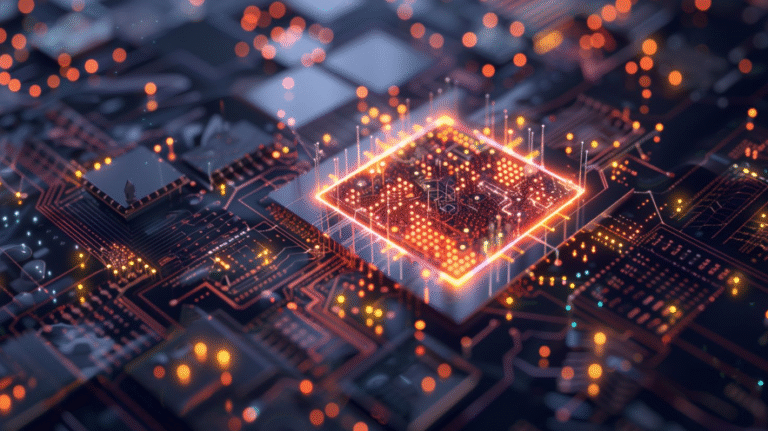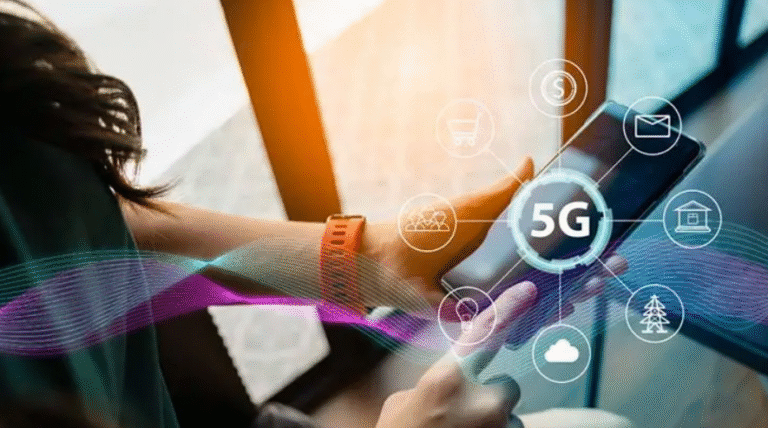Introduction: A Glimpse into AI’s Future
Artificial Intelligence (AI) has already revolutionized several industries, from healthcare to finance and entertainment. As we look towards 2025, the rapid advancements in AI technologies promise to shape our future in ways previously unimaginable. By 2025, AI is expected to not only enhance our daily lives but also redefine entire industries and sectors. In this article, we will explore the key trends, predictions, and innovations in AI that will transform the world by 2025.
1. AI-Powered Automation: Redefining the Workforce
AI will continue to be a driving force in automation, reshaping industries such as manufacturing, logistics, and customer service.
- Smart Manufacturing: By 2025, AI will power smart factories, where machines predict maintenance needs, optimize workflows, and reduce downtime. These advances will lead to cost reduction and greater productivity.
- Human-AI Collaboration: Rather than replacing jobs, AI will augment human work, automating mundane tasks and freeing up employees to focus on creative, strategic, and decision-making processes.
See also: influencersgonewild-official
2. AI in Healthcare: Personalized Medicine and Diagnostics
AI’s potential in healthcare will continue to expand, offering more personalized and precise treatment options.
- AI for Diagnostics: In 2025, AI will be instrumental in early disease detection, analyzing medical data such as images, genetics, and patient records to identify health issues before they become critical.
- AI-Driven Drug Discovery: AI will assist in discovering new drugs and therapies by predicting how molecular structures will behave, accelerating the timeline for drug development and reducing costs.
3. The Rise of General AI (AGI)
Artificial General Intelligence (AGI) will be a key area of research in the coming years. AGI refers to AI systems capable of performing tasks across a wide range of activities with the same proficiency as humans.
- Learning Beyond Narrow AI: Unlike narrow AI, which excels in one task, AGI will be able to adapt and learn across various domains, making it more flexible and versatile.
- Challenges in Achieving AGI: While we are still far from achieving true AGI, progress in neural networks, deep learning, and reinforcement learning will bring us closer to this goal.
4. AI in Autonomous Vehicles: Self-Driving Cars in 2025
Autonomous vehicles, powered by AI, will transform the transportation industry by 2025.
- Improved Safety: AI will play a critical role in making autonomous vehicles safer, reducing human errors (the leading cause of accidents) and preventing crashes in real-time.
- Traffic Flow Optimization: AI will optimize traffic flow through intelligent transportation systems, reducing congestion, and enhancing the efficiency of road networks.
5. AI in Natural Language Processing (NLP)
Natural Language Processing (NLP), which allows machines to understand and generate human language, will continue to evolve rapidly.
- Multilingual AI: By 2025, AI will become proficient at understanding and translating a variety of languages in real-time, breaking down communication barriers globally.
- Emotion Recognition: Advances in NLP will allow AI to detect and respond to human emotions, enabling more empathetic interactions with virtual assistants and chatbots.
6. AI and Cybersecurity: Fighting the Battle Against Cybercrime
As cyber threats become increasingly sophisticated, AI will play a vital role in detecting and preventing cyberattacks.
- Predictive Security: AI will be able to predict potential cyber threats by analyzing vast amounts of data, allowing companies to act proactively and prevent attacks before they occur.
- AI for Fraud Detection: In banking and e-commerce, machine learning algorithms will detect fraudulent activities in real-time, improving security for both businesses and customers.
7. Ethical AI: Ensuring Fairness and Accountability
As AI continues to infiltrate various aspects of society, ethical issues surrounding its development and use will become more prominent.
- Bias in AI: Efforts will be made to minimize algorithmic bias, particularly in fields like hiring, law enforcement, and credit scoring, where AI decisions can have significant consequences.
- AI Governance: By 2025, governments and organizations will implement AI regulations to ensure that AI systems are transparent, fair, and accountable.
8. AI-Powered Virtual Assistants: Beyond Siri and Alexa
Virtual assistants like Siri, Alexa, and Google Assistant will become much more intelligent by 2025.
- Proactive Assistance: These assistants will not just react to commands, but also anticipate needs based on user behavior, offering personalized recommendations and reminders.
- Contextual Understanding: AI virtual assistants will better understand context and nuance, allowing for more fluid, natural conversations between humans and machines.
9. AI in Education: Personalized Learning at Scale
AI will play a crucial role in shaping the future of education, making learning more personalized and efficient.
- AI Tutors: AI-powered tutoring systems will provide students with personalized lessons, adaptive learning paths, and real-time feedback, improving educational outcomes.
- Administrative AI: AI will streamline administrative tasks in schools, such as grading and scheduling, allowing educators to focus more on teaching.
10. AI in Creativity: Artistic Innovation and Content Creation
AI’s role in creative industries will grow, offering new tools for artists, musicians, and writers.
- AI-Generated Art: AI will create unique works of art, from paintings to sculptures, pushing the boundaries of traditional creativity.
- Music and Film: AI will assist in composing music, writing scripts, and even producing films, opening up new possibilities for creators and artists.
11. AI in Retail: Personalization and Customer Experience
AI will be at the forefront of transforming the retail industry, making shopping more personalized and customer-focused.
- Personalized Shopping Experiences: AI will recommend products based on individual preferences, browsing history, and purchase patterns, creating a more tailored shopping experience.
- Inventory Optimization: AI will help retailers optimize inventory management by predicting demand, ensuring products are always available when customers need them.
12. AI and Sustainability: Tackling Climate Change
AI has the potential to help solve some of the world’s most pressing environmental challenges.
- Energy Efficiency: AI will optimize energy usage in various industries, from manufacturing to transportation, reducing waste and carbon emissions.
- Environmental Monitoring: AI-powered models will help predict climate trends, enabling better decision-making and more effective conservation efforts.
13. The Evolution of AI Hardware
The development of AI hardware will support the growing demands of AI applications.
- Quantum Computing: Quantum computers will accelerate AI’s ability to process vast amounts of data, enabling breakthroughs in fields such as material science and drug discovery.
- Neuromorphic Computing: Mimicking the structure of the human brain, neuromorphic computing will make AI systems more energy-efficient and capable of handling complex tasks more effectively.
14. AI and the Metaverse: Virtual Worlds and Digital Interactions
AI will play a key role in creating immersive virtual worlds within the metaverse.
- Realistic Virtual Environments: AI will generate more lifelike and interactive virtual worlds, enhancing the overall experience for users in the metaverse.
- AI Avatars: AI-driven avatars will enable personalized interactions, providing a more engaging and human-like experience in virtual spaces.
15. The Role of AI in Space Exploration
AI is set to revolutionize space exploration by assisting in mission planning, data analysis, and spacecraft operations.
- Autonomous Spacecraft: AI will guide spacecraft autonomously, improving efficiency and enabling missions to distant planets and moons.
- Data Analysis: AI will assist in analyzing vast amounts of data from space missions, helping scientists uncover new insights about the universe.
16. Human-AI Interaction: The Changing Relationship
As AI becomes more integrated into our daily lives, the relationship between humans and machines will evolve.
- AI Companions: AI systems will offer companionship and emotional support, particularly for the elderly or those living alone.
- Humanoid Robots: AI-powered humanoid robots will assist in caregiving, customer service, and education, bringing AI closer to everyday life.
17. AI in Financial Services: Revolutionizing Banking and Investments
AI will continue to disrupt the financial services sector, enabling more efficient and secure banking, investment, and insurance services.
- AI in Trading: AI algorithms will enhance algorithmic trading, enabling faster, data-driven decisions and optimizing investment portfolios.
- Risk Management: AI will help identify and mitigate financial risks, offering predictive insights into market trends and potential threats.
18. AI’s Impact on Privacy and Data Security
As AI systems increasingly handle personal data, privacy and data security will be paramount concerns.
- Data Protection: AI will be used to enhance data encryption, ensuring that sensitive information is securely protected.
- Privacy-Preserving AI: By 2025, we will see more privacy-centric AI models designed to protect user data while still providing personalized services.
19. The Democratization of AI: Access for All
AI will become more accessible to individuals and small businesses, empowering a wider range of people to use and benefit from AI technologies.
- AI-as-a-Service: Cloud-based AI platforms will allow small businesses to integrate AI into their operations, even without advanced technical knowledge.
- Open-Source AI: Open-source AI tools and frameworks will promote innovation and democratize access to powerful AI technologies.
20. AI-Driven Government and Public Services
Governments will leverage AI to improve public services, enhance decision-making, and streamline administrative functions.
- AI for Policy Making: Governments will use AI to analyze social trends and make data-driven policy decisions in areas like healthcare, education, and climate change.
- Smart Cities: AI will power smart city infrastructure, from traffic management to waste collection, making cities more efficient and livable.
21. AI’s Impact on Ethics and Society
AI’s rapid development brings numerous ethical and societal challenges.
- Surveillance and Privacy: As AI-powered surveillance systems become more widespread, debates about privacy and civil liberties will intensify.
- The Digital Divide: Access to AI technologies will raise concerns about inequality and the potential for widening the digital divide between different social and economic groups.
22. AI in Sports: Enhancing Performance and Fan Engagement
AI will revolutionize the sports industry, offering new ways to improve player performance, fan experiences, and team strategies.
- Performance Analytics: AI will analyze players’ performances in real-time, providing insights to coaches and helping athletes improve.
- Fan Interaction: AI will engage fans by offering personalized content and creating interactive experiences through augmented reality and virtual reality.
23. AI in Retail: The Evolution of E-Commerce
E-commerce will continue to evolve with the help of AI, offering new ways to shop and interact with brands.
- AI-Powered Recommendations: AI will offer personalized product recommendations based on customer preferences and shopping habits, enhancing the online shopping experience.
- Virtual Try-Ons: AI will enable virtual try-on solutions for fashion and accessories, making it easier for customers to make informed purchasing decisions.
24. Collaborative AI: Bridging Human and Machine Intelligence
AI will play an increasingly important role in supporting human collaboration and decision-making.
- AI-Enhanced Teamwork: Collaborative AI tools will provide real-time data and suggestions to support teamwork and problem-solving, empowering human teams.
- AI in Research: AI will help researchers solve complex problems by simulating experiments and offering new insights into various fields.
25. The Global Impact of AI: Challenges and Opportunities
AI will present both challenges and opportunities on a global scale.
- International Cooperation: Countries will need to collaborate on setting global standards and ethical guidelines for AI development.
- AI for Social Good: AI will be used to tackle global challenges, from poverty and inequality to climate change and healthcare.
Conclusion: AI’s Role in Shaping the Future
As we approach 2025, Artificial Intelligence is set to transform almost every aspect of our lives. From healthcare to education, transportation, and beyond, AI’s potential is vast and multifaceted. However, it is crucial to navigate the challenges and ethical considerations associated with AI’s rapid growth. If done responsibly, AI has the power to create a more efficient, connected, and sustainable future.
FAQs
- What are the key AI trends in 2025?
Key trends include AI-powered automation, AI in healthcare, the development of AGI, and AI’s impact on sustainability and space exploration. - How will AI affect the job market by 2025?
AI will automate many tasks but also create new job opportunities, particularly in technology, healthcare, and creative industries. - Will AI become more intelligent by 2025?
Yes, AI will continue to advance, particularly in areas like natural language processing, machine learning, and autonomous systems. - What are the ethical concerns regarding AI in 2025?
Ethical concerns include AI bias, privacy issues, the digital divide, and the potential misuse of AI in surveillance. - How will AI impact healthcare by 2025?
AI will revolutionize healthcare by enabling personalized medicine, improving diagnostics, and accelerating drug development.



